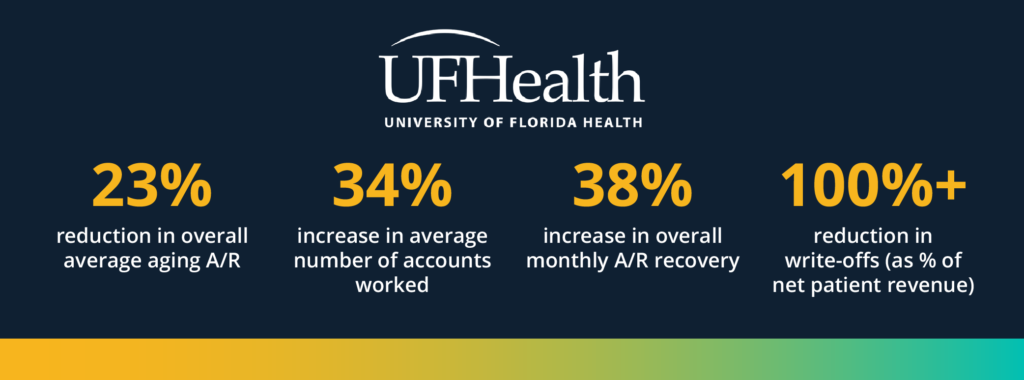
A significant amount of waste and financial loss within healthcare organizations can be attributed to inefficiencies within daily processes and programs. Realizing room for increased productivity within their revenue cycle management, University of Florida (UF) Health partnered with MedeAnalytics to catalyze change.
The Challenge
Two not-for-profit hospitals – UF Health Leesburg and UF Health The Villages – were renowned for their clinical procedures and outcomes, but struggled with unacceptably high denial rates, unreliable analytics and reporting, and very time-consuming A/R recovery processes.
The Solution
MedeAnalytics’ actionable, insights-driven and user-friendly revenue management platform catalyzed significant improvements in analytics and reporting capabilities, including:
- Real-time insights into important RCM opportunities
- Accelerated A/R recovery
- Clear A/R and denials trends, drill downs and causal analyses
- Proactive monitoring and optimization of A/R and denials
UF Health management also gained visibility into staff productivity and efficiency, as well as access to role-based, actionable reports and dashboards (enabling quick decision-making).
Measurable Impact
- 23% Reduction in Overall Avg Aging A/R
- 34% Increase in Average # of Accounts Worked
- 38% Increase in Overall Monthly A/R Recovery
- 100% Reduction in Write-offs as % of Net Patient Revenue
“MedeAnalytics’ self-service Revenue Cycle Management (RCM) offered the valuable tools and capabilities we needed to start making meaningful change. In less than six months, we saw significant advancements in A/R recovery, reduction in denials, and gains in revenue cycle staff productivity.”
– Leanzy Bailey, Corporate Manager of Denials and Audits
Watch the webinar to hear more from UF Health:
Get our take on industry trends
Why Unconventional Businesses Will Find Success in Healthcare: It’s the Data
It seems everyone is moving into healthcare. It’s a rapidly growing industry, historically dominated by large, well-embedded companies and organizations, and “pure tech” companies have had difficulty breaking in. That, however, is changing.
Read on...Data and Social Determinants of Health
By Scott Hampel – I think a lot–and I’m not the only one–about how we can improve the ways we pull information from data. Data on its own is inert: just waiting to be understood and then used. And that’s a major challenge for many organizations. Data is often trapped in different applications with no easy or convenient way to extract it.
Read on...Why Social Determinants Need Analytics for Success
Many challenges face healthcare’s underserved. There are issues with food, housing, reliable transportation, steady employment and more. Each contributes to and is one element of social determinants of health (SDH). In communities around the world, public and private organizations are taking steps to address SDH-related issues and challenges that negatively impact healthcare.
Read on...Healthcare Organizations Recognize Importance of AI for Reporting
Healthcare providers continue to recognize the value of using AI in reporting operations throughout the organization. AI has many strengths when applied to the healthcare industry:
Read on...



